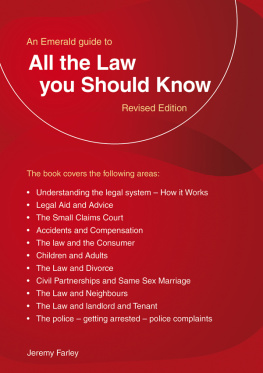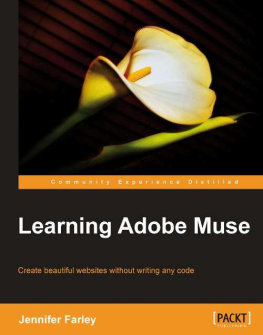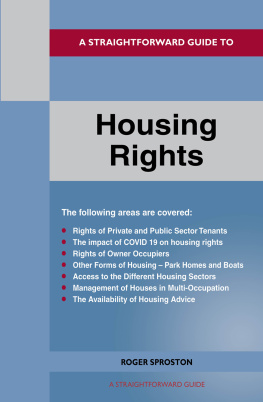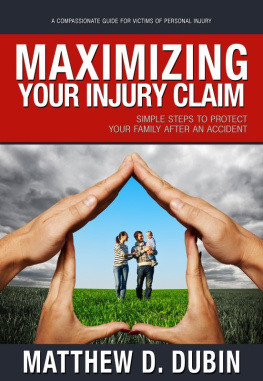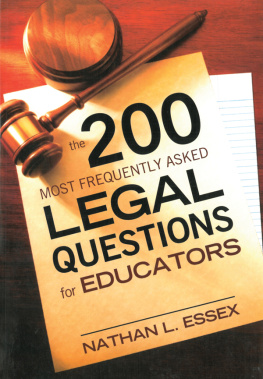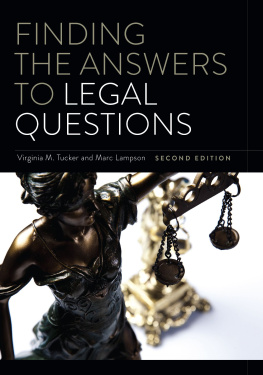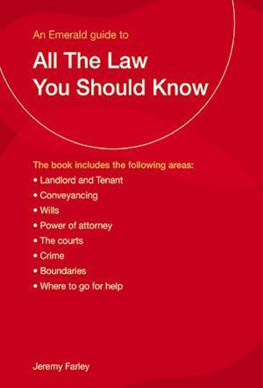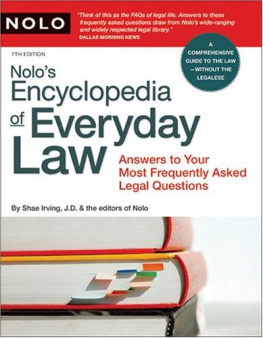ALL THE
LAW YOU SHOULD KNOW
Jeremy Farley
emerald
Emerald Guides
Straightforward Publishing 2016
All rights reserved. No part of this publication may be reproduced in a retrieval system or transmitted by any means, electronic or mechanical, photocopying or otherwise, without the prior permission of the copyright holders.
ISBN 978-1-84716-643-2
eISBN 978-1-84716-686-9
Kindle ISBN 978-1-84716-687-6
Printed by 4edge www.4edge.co.uk
Cover design by Straightforward Graphics
Whilst every effort has been made to ensure that the information contained within this book is correct at the time of going to press, the author and publisher can take no responsibility for the errors or omissions contained within.
CONTENTS
INTRODUCTION
We are all bound by the law and the British legal system. The framework of the law affects us in many ways, directly and indirectly. Right throughout our lives we will need to have a basic knowledge of the law. In this way, we can operate as citizens more effectively and we can also have a greater understanding of our rights and obligations.
The book is not a detailed textbook on the law. The purpose is to outline the law, in enough depth, and ensuring that the reader has understood the law and can then apply that law in a practical way.
This book covers, in the main, the legal system as it operates in England and Wales. To cover Scottish law in the same book would have been too great a task.
This edition has been revised in the light of the referendum result and the UK voting to leave the EU. However, all references to EU law throughout the book are still relevant until such time as we leave.
An attempt has been made to outline the operation of the legal system and also to describe the players in that system, such as solicitors and barristers and to describe the framework of financial aid that can be accessed through the legal help scheme. There is a detailed chapter on putting together a small claim and going to court with that claim. For many people, the small claims court is the most common method of seeking redress against an individual or company.
The chapters that follow the small claims court cover accidents and compensation, law and the consumer, legal relationship between children and adults, financial provisions for children, divorce, bereavement and the law, producing a will, the law and neighbours, landlord and tenant and, finally, the law and the police, what to do if you are arrested and how to complain.
The more complicated our society becomes, the more it becomes controlled by laws and regulations, the more that the individual needs to know to be able to be effective. This book cannot hope to be totally comprehensive but does cover as many key areas as possible.
Ch. 1
Understanding the Legal System-How it Works
Legal terms explained
There is a glossary of terms at the back of this book which deals with commonly used legal jargon. However, it is useful to highlight the most common terms right at the outset, as they will be used frequently throughout the book:
Claimant when legal proceedings are brought, the person or persons, or organisation, bringing the case is called the claimant.
Defendant The individual or organisation being sued, and therefore defending, is called the defendant.
Solicitor a solicitor is the lawyer you will see for legal advice relating to your case. This person will have undertaken many years of study and passed all the necessary legal examinations. We will be discussing solicitors in more depth a little later.
Barrister A Barrister is a lawyer who is a specialist in what is known as advocacy, i.e. speaking in court. A Barrister will have been called to the bar by one of the Inns of Court and passed the barristers professional examinations. A solicitor will instruct a barrister to represent you in court proceedings. However, barristers will not normally be the persons giving individuals legal advice in the first instance. The legal profession is, basically, split into two, barristers and solicitors, both of whom are lawyers.
Writ A judicial writ is issued to bring legal proceedings. Civil cases are started in the courts by issuing and serving a writ. This document is completed either by an individual bringing the case or by a solicitor on behalf of the individual. It is issued by the court.
Litigant in person a litigant is someone who is bringing legal proceedings or suing. A litigant-in-person is someone who chooses to represent themselves in court, without a lawyer.
Damages Civil claims in the courts are for damages, which is money claimed from the defendant to compensate the claimant for loss arising from the action of default of the defendant. An example might be the sale of a good that has caused injury to a person and it is alleged that the good was faulty at the time of purchase.
Using the legal system to resolve disputes
If you are contemplating any form of legal action, with or without solicitors, it is necessary to have a basic idea of how the system works. The more that you understand the processes underlying the legal system, the more effective you will be, both as a citizen and as a potential litigant.
The structure of the court system
The court system in the United Kingdom deals, in the main, with civil and criminal cases. They are heard in either the county court (civil cases) and the Magistrates and Crown Courts (criminal cases).
Civil cases are those that typically involve breaches of contract, personal injury claims, divorce cases, bankruptcy hearings, debt problems, some employment cases, landlord and tenant disputes and other consumer disputes, such as faulty goods.
Criminal cases are those such as offences against the person, theft, damage to property, murder and fraud. These cases, if of a non-serious nature, are heard in the magistrates courts. If of a serious nature, then they will be heard in the Crown Court and tried by jury.
Criminal cases
The more serious criminal cases are tried on the basis of a document called the indictment. The defendant is indicted on criminal charges specified in the indictment by the prosecutor. In most cases, the prosecution is on behalf of the Crown (State) and is handled by an official agency called the Crown Prosecution Service, which takes the case over from the police who have already investigated most of the evidence. The first stage will be to decide whether there is a case to answer. This process, called committal, will be dealt with by a magistrate on the basis of evidence disclosed in papers provided by the prosecutor. If the case proceeds, it is heard in the Crown Court. There are about 70 Branches of the Crown Court in the United Kingdom. The trial is before a judge and jury. The judge presides over the trial and considers legal issues. The jury will decide on the facts (who is telling the truth) and applies the law to those facts. In criminal cases, the prosecution has to prove, beyond reasonable doubt, that the defendant is guilty. The defendant does not have to prove innocence. However, it is the jury who will observe the prosecutor and defending lawyer and decide the case.
In less serious criminal cases (which comprise over 90% of criminal cases) the case is sent for summary and trial in one of over 400 magistrates courts. A summary trial means that there is no committal or jury. The case is decided by a bench of magistrates. In most cases there are three magistrates who are lay (unqualified) persons but are from the local community. However, there are now an increasing number of stipendiary magistrates, paid magistrates who are qualified lawyers.

